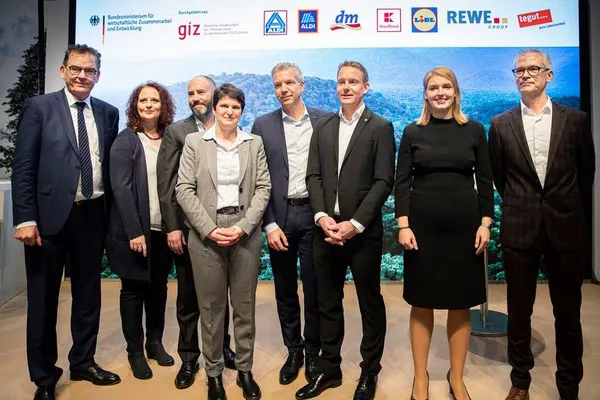The exhibition hall of the Federal Ministry for Economic Cooperation and Development (BMZ) opened its doors at the International Green Week under the motto "ONE WORLD – our responsibility." Leading German retail companies demonstrated their responsibility on the first day of the exhibition.
Aldi Nord, Aldi Süd, dm-drogerie markt, Kaufland, Lidl, REWE Group and Tegut presented their joint voluntary commitment for a gradual realisation of living wages and living incomes in agricultural supply chains for private label products in the presence of Federal Minister Dr Gerd Müller.

For the BMZ too, it is a declared goal to improve the living conditions of people positioned at the beginning of global supply chains. Federal Minister Dr Gerd Müller, together with the companies, stressed the relevance of living wages and incomes for the fight against poverty and exploitative child labour. He described the signing of the joint voluntary commitment as a milestone and called on other companies to join the retail working group.
Retail has a crucial role to play in promoting sustainable supply chains and sustainable consumption. Raw materials used in the production of private label products, such as bananas, often come from smallholder farms and plantations in partner countries in the Global South. However, many producers at the beginning of these supply chains earn very little from their work.
BMZ supports this cooperation with its Initiative for Sustainable Agricultural Supply Chains (INA), which is implemented by the Deutsche Gesellschaft für internationale Zusammenarbeit (GIZ). It coordinates the working group and provides its members with its technical expertise for the implementation of the planned activities.
By signing the voluntary commitment, Federal Minister Dr Gerd Müller and Tanja Gönner signalled their willingness to work together with the companies to implement living wages and incomes.
These measures are to be implemented in initial pilot projects by 2025.
The undersigned companies Aldi Nord, Aldi Süd, dm-drogerie markt, Kaufland, Lidl, REWE Group and Tegut agreed, among other things, on the following steps towards the realisation of living wages and incomes:
- A common understanding of the relevance of living wages and salaries should be established at all levels of the company.
- The realisation of living wages and incomes should be incorporated as a long-term goal in the sustainability policy of retail companies.
- Hotspot analyses will be used to identify agricultural supply chains in which there is a particularly high risk of low incomes and wages at producer level.
- To enable the traceability of agricultural commodities, the transparency of supply chains will be increased.
- Sustainable procurement practices are developed and implemented in cooperation with buyers and suppliers.
- Cooperation and dialogue along supply chains and with other local and international actors is strengthened, including with standards setting organisations.
- The members of the working group will report on their progress and learning experiences within a defined time frame.
- Relevant tools, data and resources will be made available within the working group and to other relevant stakeholders.
For more information:
Sustainable Agricultural Supply Chains Initiative
www.nachhaltige-agrarlieferketten.org
